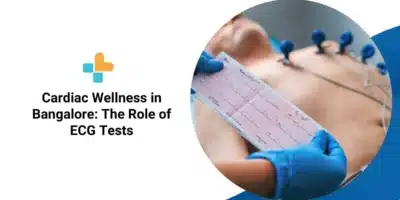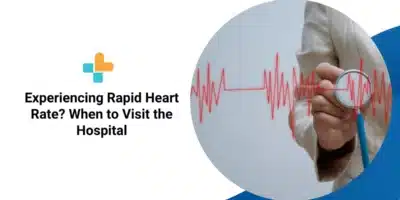![How Stress Affects the Heart [What to Do?] 6 Heart During Stress](https://ayu.health/blog/wp-content/uploads/2023/06/25553239_79z_2203_w009_n001_124c_p6_124-min-1024x683.webp)
A recent survey showed that a quarter of the Indian population struggles with stress. Living in a fast-paced world, stress has become a familiar companion for many of us.
Did you know that experiencing stress can affect your heart? Because most vital organs depend on your heart’s working efficiency, the effect of chronic stress on the heart could lead to other problems. So, how do you manage stress and avoid health issues?
In this blog, we’ll explore how stress affects the heart, some signs that stress is affecting your heart, and ways to cope with stress.
Let’s begin.
Stress and the Your Heart’s Role in the Circulatory System
Before we dive into how stress affects your heart, let’s understand what exactly stress is and the importance of your heart’s role in the circulatory system.
Definition of Stress
![How Stress Affects the Heart [What to Do?] 7 Stress](https://ayu.health/blog/wp-content/uploads/2023/06/8252024_3871893-2-1024x1024.webp)
According to medicine, stress is the body’s response to physical, mental, or emotional pressure. Chemical changes from stress raise your blood pressure, heart rate, and blood sugar levels and lead to feelings of depression, anger, anxiety, and frustration.
People tend to confuse stress with anxiety because they share a few symptoms. Anxiety is primarily characterized by persistent worries that don’t go away even when the stressor is absent.
The Heart’s Role in the Circulatory System
The heart is the most vital organ in your circulatory system. It’s responsible for pumping oxygenated blood (blood with oxygen) to all parts of the body (through the arteries) and returning deoxygenated blood (blood without oxygen) through the veins.
The heart maintains blood flow, delivers oxygen to your cells and vital organs, and helps remove waste products like carbon dioxide from the body. It also aids in regulating your body temperature and immunity.
What Happens to the Heart During Stress?
When you experience stress, your heart goes through physiological changes. When experiencing chronic stress, your heart increases the rate at which it pumps blood and beats faster to produce more blood for bodily functions.
The Fight-or-Flight Response
When you experience stress, your body activates the fight-or-flight response, which triggers the release of the stress hormones adrenaline and cortisol.
This response prepares the body for action by increasing your heart rate and redirecting blood flow to essential organs.
Adrenaline increases heart rate and contractility, while cortisol elevates blood pressure. Prolonged exposure to these hormones can contribute to chronic heart conditions if stress is not managed effectively.
Types of Stress that Affect the Heart
Here are four common types of stress that affect the heart:
- Acute stress: This is short-term stress caused by specific events or situations, such as demanding work or a sudden emotional shock. Acute stress is temporary but can have an immediate impact on heart rate and blood pressure.
- Chronic stress: This is long-term stress that persists over an extended period. It can take a toll on the heart, contributing to the development of cardiovascular diseases like hypertension, heart attack, and stroke.
- Emotional stress: Emotional stress stems from intense emotions such as grief, anger, anxiety, or depression. When these emotions are chronic or severe, they can trigger physiological responses that strain the heart.
- Environmental stress: Environmental stress refers to stressors in one’s surroundings, such as noise pollution, overcrowding, or exposure to pollutants. Prolonged exposure to these stressors can negatively impact heart health.
Tips on Managing Stress
![How Stress Affects the Heart [What to Do?] 8 Managing Stress](https://ayu.health/blog/wp-content/uploads/2023/06/15080261_2002.i203.007.healthy-lifestyle-cartoon-1-2-947x1024.webp)
Here are some helpful tips that can help you manage your stress and improve your quality of life:
- Exercise regularly: Research shows regular exercise decreases the production of stress hormones while stimulating the production of relaxation hormones.
- Eat a healthy diet: You can reduce your cortisol levels by eating foods high in polyunsaturated fats, including omega-3 fats and vegetables.
- Practise deep breathing: Studies show that controlled breathing can stimulate relaxation hormones. For example, breathing in for a count of four and breathing out for a count of eight for a few minutes can calm your nervous system down and minimize your stress.
- Find a support network: A very recent study found that having a strong social support system can help you become more resilient toward stressful events.
- Seek professional help: There’s no shame in seeking counselling if stress becomes too hard to manage alone. We highly suggest seeking the help of a professional who can help you uncover the source of your stress and offer practical ways to overcome it.
![How Stress Affects the Heart [What to Do?] 9 Managing Stress](https://ayu.health/blog/wp-content/uploads/2023/06/27828937_7320502-1-1024x1024.webp)
Manage Your Stress Effectively with Professional Help
Stress management is easier said than done. The first step toward managing stress comes from your willingness to mitigate it. If it becomes too difficult to handle, there’s no shame in seeking professional help.
If you or a loved one are experiencing symptoms of chronic stress, we invite you to book an appointment with one of our professional counsellors at Ayu Health Network of Hospitals.
With a 4.7 Google rating and thousands of positive reviews, Ayu Health is your trusted source for bodily and mental health.
Also Read : Non-Surgical Heart Blockage Treatment Options
Visit our website today and learn more.
Our Hospital Locations
Cardiac Surgery Hospitals in Chandigarh | Cardiac Surgery Hospitals in Bangalore | Cardiac Surgery Hospitals in Jaipur | Cardiac Surgery Hospitals in NCR | Cardiac Surgery Hospitals in Hyderabad
Our Doctors
Cardiac Surgery Doctors in Chandigarh | Cardiac Surgery Doctors in Bangalore | Cardiac Surgery Doctors in Jaipur | Cardiac Surgery Doctors in NCR | Cardiac Surgery Doctors in Hyderabad
About the Author

Dr. Magesh Balakrishnan
Dr. Magesh Balakrishnan is a renowned cardiologist currently practicing at Ayu Health, Bangalore.
He has 16 years of experience in this field. He has excellent skills in performing all cardiac diagnostic procedures/ tests. He has performed emergency and elective angiographies and angioplasties, device implantation (Pacemaker, AICD & CRT)

![How Stress Affects the Heart [What to Do?] 1 How Stress Affects the Heart](https://ayu.health/blog/wp-content/uploads/2023/06/blog_02-1-1-816x544.webp)


